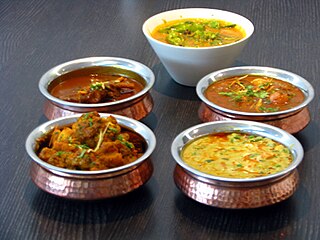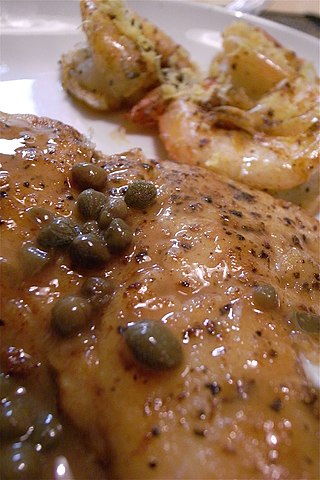
Cajun cuisine is a style of cooking developed by the Cajun–Acadians who were deported from Acadia to Louisiana during the 18th century and who incorporated West African, French and Spanish cooking techniques into their original cuisine.

Curry is a dish with a sauce seasoned with spices, mainly associated with South Asian cuisine. It is not to be confused with leaves from the curry tree, though some curries do include curry leaves. Curry is also found in the native cuisines of many South East Asian and East Asian countries due to ancient contact with South Asia.

A cuisine is a style of cooking characterized by distinctive ingredients, techniques and dishes, and usually associated with a specific culture or geographic region. Regional food preparation techniques, customs, and ingredients combine to enable dishes unique to a region.

Ethiopian cuisine characteristically consists of vegetable and often very spicy meat dishes. This is usually in the form of wat, a thick stew, served on top of injera, a large sourdough flatbread, which is about 50 centimeters in diameter and made out of fermented teff flour. Ethiopians usually eat with their right hands, using pieces of injera to pick up bites of entrées and side dishes.

A condiment is a preparation that is added to food, typically after cooking, to impart a specific flavor, to enhance the flavour, or to complement the dish.

In cooking, to coddle food is to heat it in water kept just below the boiling point. In the past, recipes called for coddling fruit, but in recent times the term is usually only applied to coddled eggs. Coddling differs from poaching in that the coddled ingredient is not placed directly in hot water, but instead in a small dish placed in a hot water bath. The process is either done in a regular pan or pot filled with water, either on the stovetop or placed in the oven, or through the use of a special device such as an "egg coddler". The oven technique is similar to the preparation of baked eggs, the difference being that the preparation of baked eggs does not have to employ a water bath.

Louisiana Creole cuisine is a style of cooking originating in Louisiana, United States, which blends West African, French, Spanish, and Native American influences, as well as influences from the general cuisine of the Southern United States.

Scrambled eggs is a dish made from eggs stirred, whipped, or beaten together typically with salt, butter, oil, and sometimes other ingredients, and heated so that they form into curds.

Punjabi cuisine is a culinary style originating in the Punjab, a region in the northern part of South Asia, which is now divided in an Indian part to the east and a Pakistani part to the west. This cuisine has a rich tradition of many distinct and local ways of cooking.

Pilaf, pilav or pilau is a rice dish, usually sautéed, or in some regions, a wheat dish, whose recipe usually involves cooking in stock or broth, adding spices, and other ingredients such as vegetables or meat, and employing some technique for achieving cooked grains that do not adhere to each other.

Paul Prudhomme, also known as Gene Autry Prudhomme, was an American celebrity chef whose specialties were Creole and Cajun cuisines, which he was also credited with popularizing. He was the chef proprietor of K-Paul's Louisiana Kitchen in New Orleans, and had formerly owned and run several other restaurants. He developed several culinary products, including hot sauce and seasoning mixes, and wrote 11 cookbooks.
Maharashtrian or Marathicuisine is the cuisine of the Marathi people from the Indian state of Maharashtra. It has distinctive attributes, while sharing much with other Indian cuisines. Traditionally, Maharashtrians have considered their food to be more austere than others.

Meunière is both a French sauce and a method of preparation, primarily for fish, consisting of brown butter, chopped parsley, and lemon. The name suggests a simple rustic nature, i.e. that to cook something à la meunière was originally to cook it by first dredging it in flour.

Malaysian Indian cuisine, or the cooking of the ethnic Indian communities in Malaysia, consists of adaptations of authentic dishes from India, as well as original creations inspired by the diverse food culture of Malaysia. Because the vast majority of Malaysia's Indian community are of South Indian descent, and are mostly ethnic Tamils who are descendants of immigrants from a historical region which consists of the modern Indian state of Tamil Nadu and Sri Lanka's Northern Province, much of Malaysian Indian cuisine is predominantly South Indian inspired in character and taste. A typical Malaysian Indian dish is likely to be redolent with curry leaves, whole and powdered spice, and contains fresh coconut in various forms. Ghee is still widely used for cooking, although vegetable oils and refined palm oils are now commonplace in home kitchens. Before a meal it is customary to wash hands as cutlery is often not used while eating, with the exception of a serving spoon for each respective dish.

A food paste is a semi-liquid colloidal suspension, emulsion, or aggregation used in food preparation or eaten directly as a spread. Pastes are often highly spicy or aromatic, are often prepared well in advance of actual usage, and are often made into a preserve for future use. Common pastes are some fruit preserves, curry pastes, and nut pastes. Purées are food pastes made from already cooked ingredients.

The cuisine of New Orleans encompasses common dishes and foods in New Orleans, Louisiana. It is perhaps the most distinctively recognized regional cuisine in the United States. Some of the dishes originated in New Orleans, while others are common and popular in the city and surrounding areas, such as the Mississippi River Delta and southern Louisiana. The cuisine of New Orleans is heavily influenced by Creole cuisine, Cajun cuisine, and soul food. Later on, due to immigration, Italian cuisine and Sicilian cuisine also has some influence on the cuisine of New Orleans. Seafood also plays a prominent part in the cuisine. Dishes invented in New Orleans include po' boy and muffuletta sandwiches, oysters Rockefeller and oysters Bienville, pompano en papillote, and bananas Foster, among others.

Anchovy paste is a fish paste food product prepared using anchovies as a primary ingredient. It is used as a condiment and as an ingredient in various dishes, such as Scotch woodcock, and is a mass-produced product. It has been used for centuries to provide flavor to foods and as a source of nutrients, and it is a part of the cuisines of Great Britain, Italy, the Philippines and Vietnam. It is a major export product of Morocco.

















